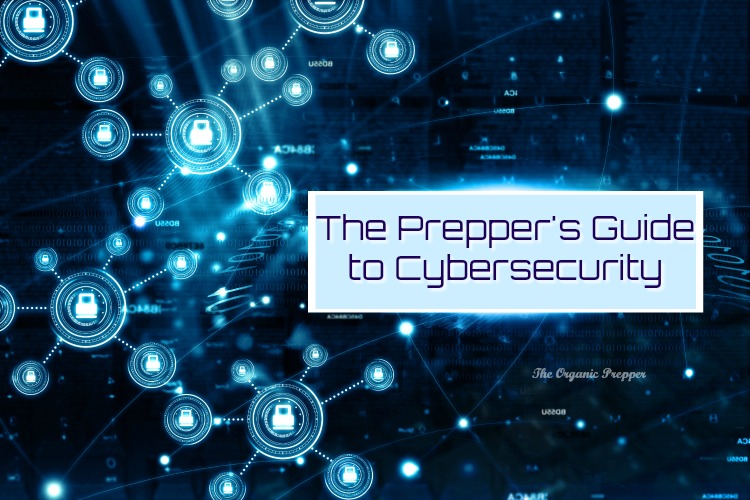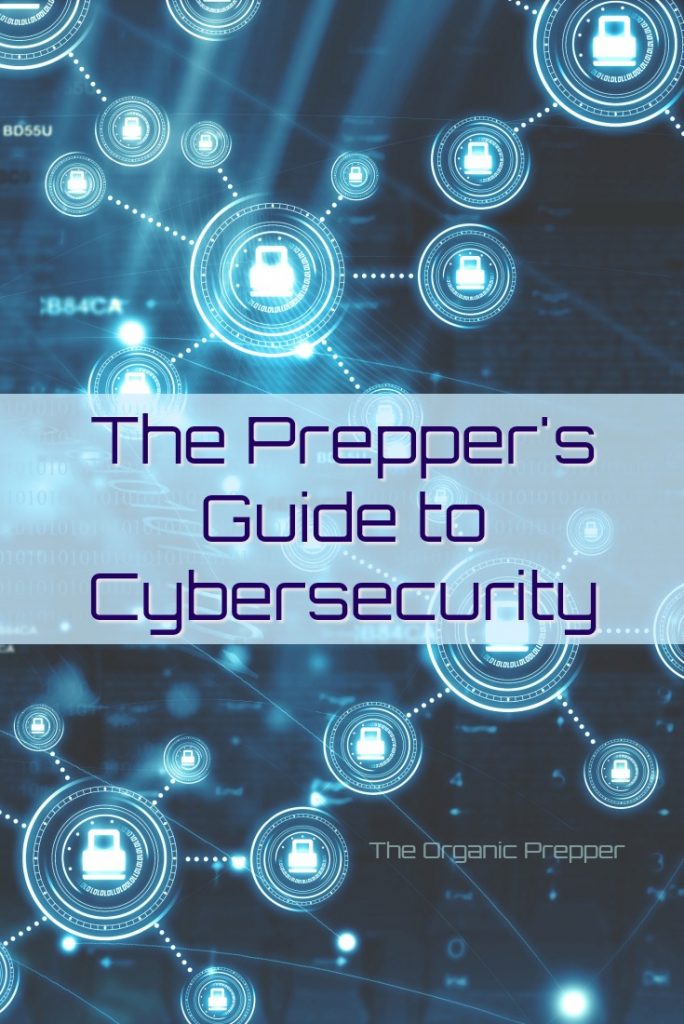If you're new here, you may want to subscribe to my RSS feed. Thanks for visiting!
How savvy are you about cybersecurity? Technology is ever-changing, and that alone can make it overwhelming. If you have put off learning how to protect your computer, however, I urge you change that ASAP. Preppers get a lot of information and products from the internet, so you’ll want to make sure to practice good cybersecurity so you don’t give away too much of your own information.
According to Ceasar Cerrudo, cybersecurity should be our biggest concern. He would know. He’s a professional hacker.
Cerrudo’s company, IOActive, provides hacking services to find vulnerabilities in order to improve cybersecurity. His predictions should be a wake-up call to get savvy about cybersecurity.
Some experts predict that by 2020 there will be 200 billion connected things. Cars, planes, homes, cities, and even animals are being connected. We are putting software everywhere. This is changing the way we live and how we behave and interact with the world around us. As technology becomes more and more deeply integrated into our lives, we become more and more dependent on it. But this dependence makes us vulnerable if technology fails.
Cerrudo goes on to point out:
I see the same problems over and over again. We are not getting better. And while we depend more and more on technology, technology is becoming more and more insecure.
In my experience, most technology is vulnerable and can be hacked.
Considering how our computers, phones, cars, home security systems, banking, appliances, pace-makers, insulin pumps, and more are becoming “connected”, privacy and security have never been more important.
Cyber Threats: What Are They?
Cyber threats come from hackers and scammers. Hackers will exploit vulnerabilities on your computer or other connected devices to gain access to your private information. They do this through malware. Scammers exploit human error, naivety, and opportunity. Scammers will use phishing emails, websites, malware, or other strategies to break into your device.
Malware
Malware is the nickname for “malicious software”. It used to be that the only big threat of malware out there in cyberspace were computer viruses. Oh, how things have changed. Today, we can have adware, spyware, crapware, scareware, and ransomware.
Ransomware, such as WannaCry, Petya, BadRabbit, and NotPetya have made major headlines in the past few months. They lock your computer down unless you pay a “ransom”. Of course, this often does not lead to you getting access to your computer. The hackers usually just take the money and run.
Phishing
Ever get that email that says Microsoft, Amazon, eBay, or some other recognizable company claims you need to log in to your account to update security or verify your account information?
Or, how about those email scams that claim you have inherited a billion dollars from some unknown relative and Nigerian Prince Notrealperson or an attorney from Zimbabwe who needs you to wire him a thousand dollars to get the transfer of funds process started? These are examples of phishing.
Phishing emails and websites steal your login information. From here, scammers can go shopping for themselves on your dime, order gift cards which they sell, shut off your home security system, and who-knows-what-else.
The ransomware that halted shipping giant Maersk was sent through an email. John Podesta, Hillary Clinton’s campaign manager, had his emails breached because of a phishing email, resulting in the Podesta email scandal exposed by Wikileaks that many blame for Clinton’s loss.
Which Operating System Is Most Vulnerable to Cyber Attack?
Could preventing a cyber attack be as simple as picking the right operating system? Yes and no. How’s that for being as “clear as mud”?
Windows, Apple, and Linux provide the three most used operating systems. There’s been a lot of hype that Windows machines are more susceptible to cyber attack. Conversely, Apple and Linux systems were supposedly more secure.
According to this article from The Conversation, the answer is not so cut and dried. Calling it “security by obscurity”, the article had this to say about comparing Windows to Apple:
Whatever the technical vulnerabilities of the two systems, the historical lack of malware targeting Apple systems was at least in part due to Apple’s own lack of market share.
Windows had more attacks because more people used that system than Apple. The same is true of Linux. However, according to this ranking of the 10 most vulnerable operating systems, Apple and Linux have more actual vulnerabilities.
Considering that more people are now using Apple and Linux, it would be reasonable to expect more targeting of their systems, negating any “security by obscurity”.
How to Protect Yourself In a Connected World
As we have seen, there are many ways a hacker or scammer can gain access to your connected devices and your private information. Thankfully, there are simple, actionable steps you can take to keep your connected devices and private information secure.
Update Your Operating System Frequently
Every operating system has vulnerabilities. Programmers are continually updating them to fix these vulnerabilities. Check for updates frequently. In Windows, you can choose to update automatically. Just pick a time you don’t normally use your computer, or your work will be interrupted.
Install Security Software and Keep It Up-To-Date
A few things to make sure you have on your computer: a firewall (usually pre-installed) and anti-virus/anti-malware software. Sometimes, anti-virus software is pre-installed.
There are also plenty of free, downloadable anti-virus and anti-malware software available. These are usually scaled down versions of subscription-based software with additional protections. But, I like free. Free works for me.
Here is an article with top picks and more in-depth reviews of several free anti-virus and anti-malware programs available. I was happy to see the programs I use (AVG and Avira) on this list. With these options, there is no excuse not to have protection.
As with your operating system, update your security software often.
Take Your Time with Email
Most phishing scams have graduated from the “send money so I can send you money” fraud. They have become much more sophisticated.
A major red flag should be any email that asks you to enter login and password information. No company will send legitimate emails asking for this information. If you see an email asking you to enter your personal information, it’s a scam. Do not click on any of the links.
Other things to look for are typos. Phishing scams, even the sophisticated ones, usually have a typo or something “off” with the company logo. If something looks off, it probably is. Unfortunately, people in a rush tend to miss these inconsistencies.
In short, if you don’t know who sent you an email, or the content seems odd, don’t click on anything in it. The same is true for Facebook Messenger and other messaging apps. You can easily message your Facebook friend or fire off an email. Ask them if they indeed sent you a message or email with a link.
Secure Your Wifi
Leaving your wifi open is like leaving your front door open. This allows anyone to access your wifi where they can then download illegal files. PCMag.com put this article together with 12 different ways to secure your wifi. Unless you live in an internet café, you need to lock that signal down.
Password Protect Everything
Use that password-protection feature on all of your devices. Those tablets, phones, cameras, and laptops must have a password. Various websites and services, like Amazon, offer two-step verification. It might take an extra moment, but it’s worth it to prevent someone from accessing your account.
Be a Password Ninja
Ok, I don’t know if there is such a thing as a password ninja. What I’m getting at is to be creative and stealthy with your passwords. We all know the password recovery questions that are commonly asked. Things like your mother’s maiden name, the city where you grew up, the make and model of your first car, and so on.
So much of that information is easily accessible on the internet, that these password recovery questions offer very little security. Hackers and stalkers can easily gain access to this kind of information online.
If you get to create a custom security question, great. If not, make up an answer to one of the common questions that no one will predict. For example, select mother’s maiden name, but set the answer as your favorite subject in school. Or, for what city did you grow up in, set the proper response as, “The one I still live in.” Someone stalking you is going to do an internet search for the actual personal information to gain access to your accounts. They won’t be able to guess your unrelated response or your snarky comment.
Stop Linking Services
You read an article. You really, really want to comment. But, in order to comment, you need to log in with Facebook or Twitter. Don’t do this. Every time you “log in” with a social media account, think about all the info that account has on you. Do you really want to just give someone access to it all?
If you can log in with a username and password, take the time to create one. Otherwise, just let that urge to comment go. You have more important things, like prepping, to get done.
Get a VPN
A VPN allows you to make it look as if you are logging into your device in a completely different location than you are. It offers some protection if you have to use an open wifi signal when you’re on the go. But, the most important benefit, according to PCMag.com is malware protection:
The most important is that it is difficult, if not impossible, for advanced worm-style malware that can self-install via open ports to ever target your computer. Your machine will appear to be another system someplace else; that other machine is usually a highly protected server and, more importantly, it is not your computer.
How do you protect your information online?
All this can feel overwhelming. I know I have passed over many articles and warnings about cybersecurity in the past because I’m not the most tech-savvy, gadgety girl out there. Trust me, when you start looking into the solutions, it’s really not that bad.
How do you protect your information and devices? Share your best cybersecurity tips in the comments below.

















One Response
Every Windows device requires a User Name to get to the desktop. By default Windows sets up two accounts the first time you log on to a new machine, an admin and a standard user. Neither are password protected until you create a password. My practice is to change the standard user account to a guest account and immediately protect both with a password containing a combination of upper and lower case letters, numbers and special characters. A guest account can’t install or change anything. If you need to install software do it from the admin account, never surf the internet while logged in as an admin. The latest update of Windows 10 provides sandboxing which isolates the system from malware when you click on a link, especially in email. You are still at risk if you open an attachment.